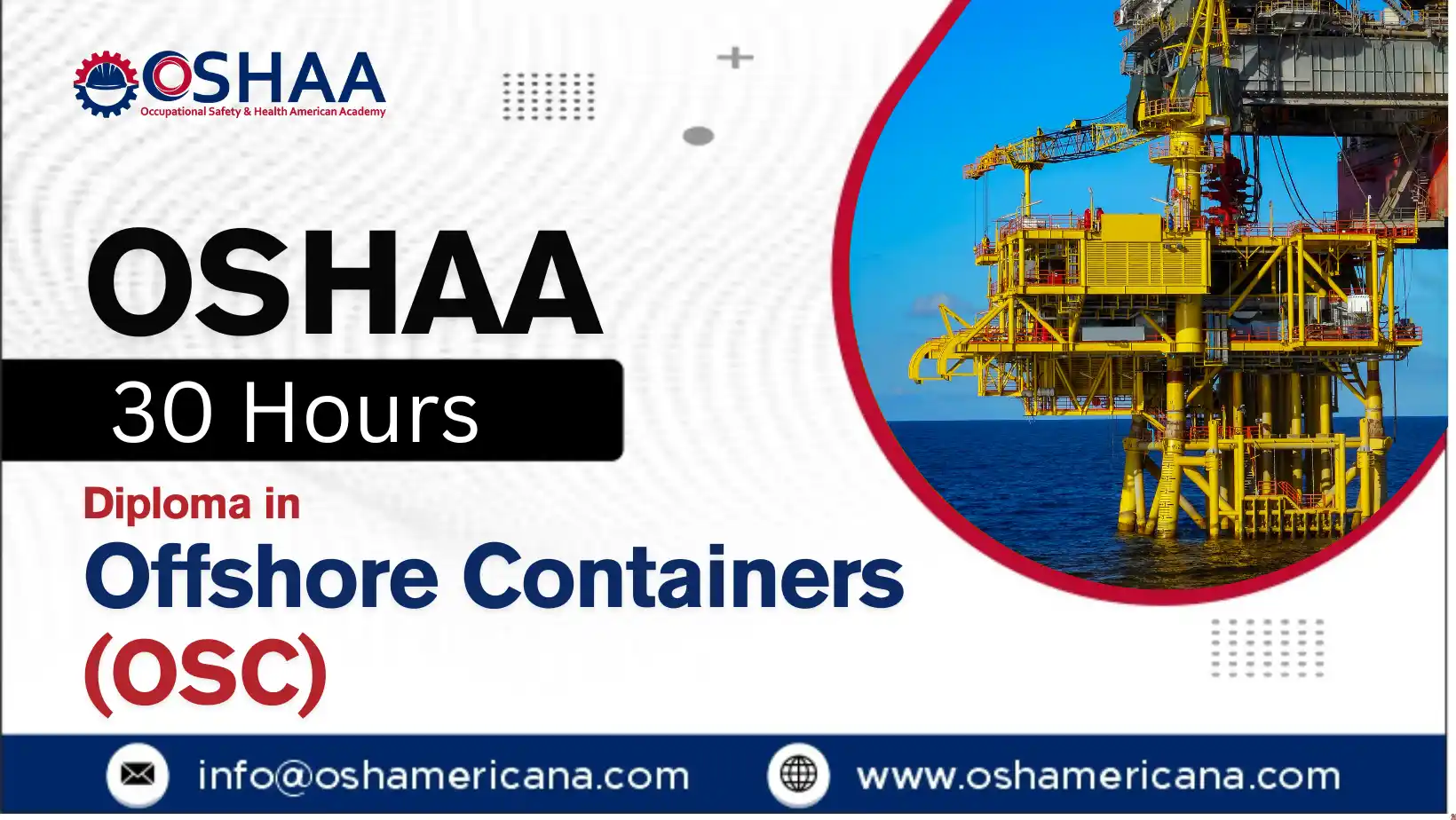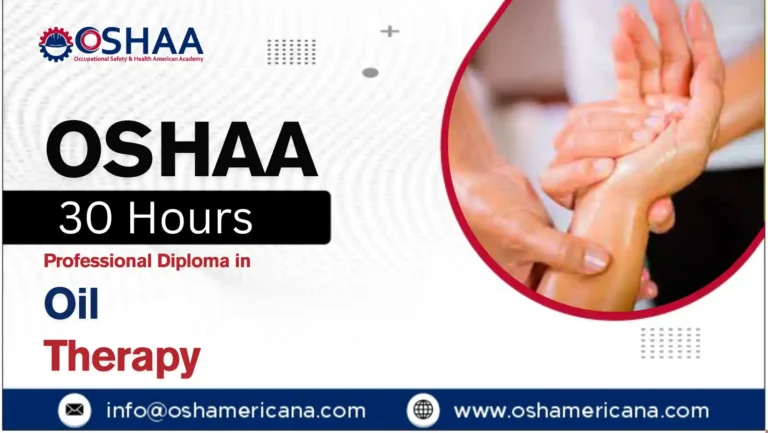Master Offshore Safety with the Diploma in Offshore Containers (OSC)
In the dynamic offshore industry, safety, compliance, and equipment integrity are paramount. The OSHAA 30-Hours Diploma in Offshore Containers (OSC) is a leading qualification for professionals seeking specialized expertise in offshore container safety and management. This comprehensive course is designed to meet international standards and best practices in offshore logistics and container operations.
Offshore containers play a vital role in transporting and storing tools, equipment, and materials under harsh marine conditions. The OSHAA OSC diploma provides in-depth knowledge of container design, inspection, maintenance, and certification in line with DNV 2.7-1, ISO standards, and global regulations. Participants learn to identify risks, prevent failures, and conduct safe lifting operations — enhancing operational efficiency and minimizing downtime.
The 30-hour program is ideal for working professionals, including safety officers, offshore technicians, logistics coordinators, and inspectors. Key modules cover offshore lifting operations, structural integrity, corrosion protection, and legal compliance, all delivered by industry experts. By emphasizing practical application alongside theory, this diploma builds confidence in safety-critical decision-making, strengthens credentials, and boosts career opportunities in high-risk offshore environments.
OSHAA 30-Hours Diploma in Offshore Containers (OSC)
Study Units
Learning Outcomes
Introduction to Offshore Containers and Industry Regulations (3 hours)
- Understand the role and importance of offshore containers in marine and oil & gas operations.
- Identify key international regulations and standards (e.g., DNV 2.7-1, ISO, IMDG Code).
- Recognize classification and certification requirements for offshore containers.
Design and Manufacturing Standards (3 hours)
- Explain the fundamental design principles of offshore containers.
- Interpret manufacturing standards and requirements for structural integrity.
- Understand material selection, welding criteria, and safety margins in design.
Inspection and Testing Procedures (5 hours)
- Perform visual and non-destructive testing techniques for offshore containers.
- Identify inspection intervals and documentation protocols.
- Evaluate load testing procedures and inspection criteria for certification compliance.
Maintenance and Repairs of Offshore Containers (3 hours)
- Identify common types of damage and deterioration in offshore containers.
- Apply appropriate maintenance and repair strategies according to industry standards.
- Understand the importance of inspection records and repair traceability.
Lifting Operations and Rigging Practices (5 hours)
- Understand safe lifting practices and offshore rigging techniques.
- Select appropriate slings, shackles, and lifting accessories for different operations.
- Identify load limits, center of gravity, and risk factors during lifting procedures.
Container Identification, Marking, and Traceability (2 hours)
- Recognize mandatory markings, ID numbers, and certification plates on offshore containers.
- Understand data tracking and traceability systems in container logistics.
- Apply proper labeling procedures to ensure regulatory compliance.
Corrosion Protection and Surface Treatment (2 hours)
- Identify common corrosion mechanisms affecting offshore containers.
- Understand coating types, surface preparation, and protective treatment methods.
- Apply preventive strategies to extend container lifespan in marine environments.
Risk Assessment and Hazard Control (3 hours)
- Conduct risk assessments specific to offshore container operations.
- Identify potential hazards and implement appropriate control measures.
- Apply proactive safety planning to mitigate risks in container handling.
Roles and Responsibilities in Offshore Logistics (5 hours)
- Define the roles of key personnel involved in offshore container logistics.
- Understand the responsibilities of safety officers, inspectors, and logistics coordinators.
- Coordinate effective communication and documentation practices in offshore operations.
Course Benefits
- Enhanced Knowledge and Compliance
Gain a solid understanding of international standards such as DNV 2.7-1, ISO, and IMDG Code, ensuring full regulatory compliance in offshore container operations. - Improved Workplace Safety
Learn how to identify, assess, and control risks associated with offshore container handling, contributing to a safer working environment. - Industry-Relevant Skills
Develop practical skills in inspection, lifting operations, maintenance, and corrosion control that are directly applicable to offshore roles. - Career Advancement Opportunities
Strengthen your professional profile and increase eligibility for supervisory, inspection, and HSE roles within the offshore and marine sectors. - Certification from a Recognized Program
Earn a certificate that validates your competency in offshore container management, recognized by employers across the oil & gas and maritime industries. - Hands-On Application
Gain insights through case studies and real-world scenarios that prepare you to make informed decisions in high-risk offshore environments. - Versatility Across Roles
Beneficial for safety officers, logistics coordinators, rigging specialists, and maintenance personnel involved in offshore operations. - Increased Operational Efficiency
Improve equipment reliability and minimize downtime through proper handling, inspection, and preventive maintenance practices. - Cost Savings for Employers
Organizations benefit from reduced accidents, lower repair costs, and improved regulatory compliance through better-trained staff. - Confidence in Regulatory Audits
Be prepared for audits and inspections with up-to-date knowledge on container certification, documentation, and legal responsibilities.
The OSHAA 30-Hours Diploma in Offshore Containers (OSC) is designed for professionals and personnel involved in the handling, inspection, maintenance, and management of offshore containers. This course is ideal for:
- HSE Officers and Safety Managers
Seeking to enhance their knowledge of offshore container safety, risk assessment, and regulatory compliance. - Logistics and Supply Chain Coordinators
Responsible for organizing and managing the transportation and storage of offshore containers. - Rigging and Lifting Supervisors
Involved in planning and supervising offshore lifting operations using certified containers. - Inspection and QA/QC Personnel
Tasked with conducting inspections, testing, and verifying offshore container integrity and certification. - Offshore Engineers and Technicians
Working with containerized equipment in oil & gas, marine, and wind energy operations. - Maintenance and Repair Teams
Handling repairs, structural assessments, and the upkeep of offshore container assets. - Port and Terminal Operators
Involved in container loading, unloading, and compliance checks at offshore and coastal facilities. - Personnel Transitioning to Offshore Roles
Looking to build foundational knowledge and gain industry-recognized certification to enter the offshore logistics field.
This course is suitable for both new entrants seeking structured training and experienced professionals aiming to update their skills in line with current international standards.







